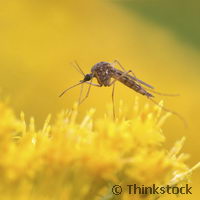Trending science: A GM mosquito to eradicate malaria
A new technique developed by researchers on the genetic modification of mosquitoes may make a vital contribution to eradicating malaria. Malaria kills more than 1 million people each year. The new technique by a team at Imperial College London involves injecting mosquitoes with a gene that causes the vast majority of their offspring to be male. According to the Guardian, this leads to an eventual dramatic decline in population within six generations as females disappear. The Guardian quotes Andrea Crisanti, one of the authors of the new research, who states, 'You have a short-term benefit because males don't bite humans [and transmit malaria] ... But in the long term you will eventually eradicate or substantially reduce mosquitoes. This could make a substantial contribution to eradicating malaria, combined with other tools such as insecticides.' The research, which was published in the journal Nature Communications on Tuesday, involved scientists injecting mosquitoes with a gene from slime mould - a homing endonuclease called I-PpoI - which attached itself to their X chromosome during the male's sperm-making process and effectively shredded part of the chromosome's DNA. The Guardian reports that the result was that more than 95 % of the mosquitoes' offspring were males. Researchers found that the modified mosquitoes mated with wild mosquitoes, creating fertile mosquitoes which then overwhelmingly produced male offspring, passing on the gene. According to Crisanti, the engineering represents a 'quantum leap' in terms of what has been done before. The Guardian also quotes Nikolai Windbichler, a research fellow at Imperial College London and co-author, who says that the concept of distorting the sex of a pest's population is more than 50 years old but that the technology had not been available until now to execute the idea. However, while welcoming the research, Howstuffworks.com also sounds a note of caution. 'There are several issues that make the findings, while promising, very preliminary and really only the tip of the iceberg in terms of actually using GM mosquitoes to stem the spread of malaria.' The writer continues, 'Under the best of circumstances ... it'll be at least another 10 years before malaria-resistant mosquitoes would ever be released into the wild. There are significant concerns about releasing tens of thousands of genetically modified animals into a natural setting.' Howstuffworks.com notes that nothing on this scale has ever been done before and there's no way to know what the long-term ecological implications might be. One scenario could be that the malaria parasites might adapt to the genetic makeup of their new hosts, keeping the disease alive but in a form for which we have no treatment at all. Dr Luke Alphey, group leader of the vector-borne viral diseases programme at the Pirbright Institute, takes a more positive note. He tells the Guardian that this research is a 'big step forward' adding, 'The overall goal of this research programme is even more ambitious - to develop a version of this genetic system that will spread itself through the target species, removing females and causing population crash or extinction as it goes.'For more information, please visit:http://www.nature.com/ncomms/2014/140610/ncomms4977/full/ncomms4977.html



